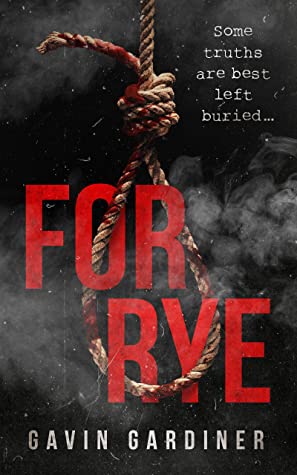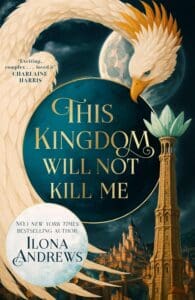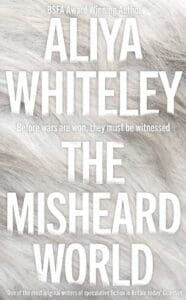
Rating: 10/10
Synopsis
Renata Wakefield, a traumatised novelist on the brink of suicide, is drawn back to her childhood hometown following her mother’s ritualistic murder. Before long, she becomes ensnared in the mysteries of Millbury Peak as one question lies heavy: who killed Sylvia Wakefield?
As the answer draws nearer, as madness continues to envelop the quaint country town, Renata will come to realise that the key to all this insanity lies with one man—the world’s leading writer of horror fiction. His name is Quentin C. Rye, and he will guide her to the revelation that true madness lies within.
Discovering that the darkness of her family’s history runs deeper than she ever could have imagined, Renata Wakefield’s eyes will finally be opened to one single, hideous truth, which will awaken a long-dormant evil.
Review
Like most of the debut novels I receive, For Rye came to my attention via email. Our fearless leader asked if anyone was interested. Now, I enjoy horror novels, but my experience with them has been limited to a single Stephen King novella, a handful of Dean Koontz novels, and as many ghost stories as I can consume. I am a sucker for anything paranormal, even though it scares the shit out of me. I digress.
When I read the synopsis for For Rye, I’ll admit it—I was skeptical. It sounded like your run-of-the-mill murder mystery and even though I could smell the ending from a mile away, I was still interested. It would be fun, even if it was a tad predictable.
DON’T JUDGE A BOOK BY ITS COVER, TORI.
Anyway, I reached out to the author to discuss an ARC. He was so nice. I was convinced that he couldn’t write a horror novel because he was so nice. Books, covers, you know the drill. While I initially requested a physical ARC, I was finally able to receive one electronically. Boy, am I glad I didn’t have to wait. But we’ll get to that in a moment. Gradually, slowly. For Gardiner.
From the first line of the book, I immediately connected with our protagonist, Renata. I won’t spoil anything, although I’m dying to talk about this book with someone, but I will say that she has an almost obsessive repetitive notion going through her head constantly. I suffer with Borderline Personality and Bipolar 2 Disorders, and one of the things that characterizes these illnesses is a tendency to dwell on thoughts like this with an obsessive-compulsive-like fury. For me, intrusive thoughts play like a broken record: constantly skipping beats and playing back when I’m not thinking of anything close to them. For Renata, it’s similar, but hers come with flashes of pain that readers can easily interpret as migraines. Renata’s suicidal tendencies were, in all honesty, one of the reasons I agreed to review the book. For so long, I have craved a character that thinks even a little bit like I do. They’re so hard to write, though. I’ve tried. It never comes out quite right. But Gardiner did what so few have ever been able to do, and that is part of what makes For Rye so special. I may be overstepping or misdiagnosing Renata here, but she exhibits classic symptoms of a person with Borderline Personality Disorder. And this disorder often stems from childhood abuse, which brings me to my next topic….
Thomas Wakefield. I want to talk about Quentin Rye as well, but I’m saving him for last so I can put a spoiler warning at the end of the article. Thomas Wakefield is a preacher—a zealot of the highest order. He is without doubt a fascinating character, but he is about as charming as a blister on the webbing of your toes. He is abusive to both Renata and Sylvia, her mother, and is openly disdainful toward Renata as an adult, even when she attempts to care for him. There is clear favoritism that factors in later, and a shocking reason why that makes LOADS of sense, but none of it justifies what he puts Renata through.
I was not outright abused as a child. I wasn’t neglected or locked in dark cellars for hours on end, left to mess myself and cry. But I have been through a lot of things, and it has resulted in PTSD. I don’t say this as an attempt to gain your sympathy. I want to try to convey what I was feeling during my time with Renata. When she was locked in a cellar by herself with nothing but moths to keep her company, I was reliving my own nightmare of being buried in dead moths. When she was facedown on the floor at five years old under her father’s boot, I was watching my mother throw a chair at my sister. For Rye is not an easy read for anyone with mental illness, but I will tell you this: it was one of the most cathartic experiences of my life. Gavin Gardiner gave me a character that I could see myself in: she was broken, manipulated, meek. And I was rooting for her to come back strong and solve this mystery. I was ready to see her get her life back.
And then shit hit the fan.
THE FOLLOWING SECTION CONTAINS MINOR SPOILERS FOR FOR RYE. VIEW AT YOUR OWN DISCRETION.
With the reveal of Quentin’s treachery, Renata snaps. No one can blame her. She trusted him, and he betrayed her. Everyone she loves betrays her. With the constant question of where her brother is and why her nightmares are getting worse the longer she stays in Millbury Peak, her life and her psyche begin to unravel. Instead of rooting for Renata, I pitied her. I prayed she would see reason (“When did Saruman the Wise abandon reason for madness?”) and come to her senses. Violence erupts and unfortunately, the recipient is an innocent teenage girl: Rye’s daughter.
It’s an interesting dichotomy, I think. We have Rye and Sandie on one hand and Renata and Thomas on the other. Rye obviously loves his daughter very much, and Thomas never had anything but contempt for Renata at the best of times. So when these two daughters clash, we see what Renata could have had if she had been born with a father that loved her. We also get a glimpse of that in a different way, but that’s too spoiler-y for this review. Renata sees this, too, and comments on it often. I think a lot of the reason she targets Sandie is jealousy. Yes, she hates Rye, but she also hates Sandie for everything she is that Renata isn’t. Beautiful, vivacious, young. Loved. Most of all, loved. She sees that and, in her mind, believes she must take it away.
I want to touch on one more thing before I wrap up this obscenely long and rambly review. There is this idea of victimhood that gets explored in the novel. Obviously, Sandie is solely a victim. She did no wrong. But then we have Renata, Thomas, Sylvia, and Quentin. Sylvia isn’t an evil person by any means. She is a battered wife. But by being silent, she was complacent in Renata’s abuse, and therefore her hands are not clean. So she was both a victim and perpetrator. Renata’s, Quentin’s, and Thomas’ crimes are a little more cut-and-dry. But still, they are victims in their own rights. I think the idea here is that adults are never innocent. There is always some darkness, some secret, some driving force that makes us vile creatures tick. For Rye offers up great opportunity to discuss whether or not goodness can be whittled out of men and women. Ultimately, I think it can. And in Renata’s case, it was.







[…] at the seams with creativity and unpredictability.” And I was particularly pleased that Victoria Gross from FanFiAddict found in my book a cathartic experience:“For Rye is not an easy read for anyone with mental […]